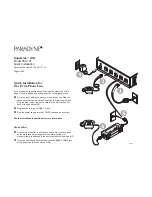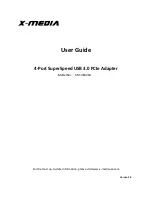
2
228-1671 REV 2
110122
KEPCO, INC.
131-38 SANFORD AVENUE
FLUSHING, NY. 11355 U.S.A.
TEL (718) 461-7000
FAX (718) 767-1102
http://www.kepcopower.com
email: [email protected]
Figure 3 shows HSF’s in slots 3 and 4 connected in paral-
lel with forced current sharing and a close-on-fail alarm
circuit. Both HSF modules are configured for output volt-
age to be adjusted from the front panel trimpot (factory
default setting). See
for other output
voltage adjustment options.
Configure DIP 4:
1. Set positions 1 and 2, to OFF to disable local sensing
for slot 4.
2. Set positions 3 and 4, to ON. This connects sense lines
(+S to +S and –S to –S) for slots 4 and 3.
3. Set position 5, to ON. This connects the current share
bus (CB) for slots 4 and 3.
4. Set positions 6 and 7 to ON. Position 6 connects the
normally open ALARM (N.O.) lines and position 7 con-
nects the ALARM (COM) (common) for slots 4 and 3,
implementing a close-on-fail alarm circuit (see equiva-
lent schematic shown in Figure 3. If either PS3 or PS4
fails, a contact closure provides continuity across pins 7
and 14 of both I/O 4 and I/O 3.
5. Set position 8 to OFF. This position is only set to ON for
open-on-fail alarm circuits.
6. Set position 9 to OFF. Isolates RV (remote voltage)
lines between slot 4 and 3, however RV is not used
(output voltage is controlled by the front panel trimpot).
7. Set position 10 to ON. This connects the common lines
(-COM) for slots 4 and 3.
TABLE 1. REAR PANEL DIP SWITCH FUNCTIONS
DIP
SWITCH
POSITION
FUNCTION
DIP SWITCH SETTINGS
1, 2
Local /
Remote
Sensing
Selection
Position 1 connects V+ to S+, Position 2 connects V– to S– .
Both required ON (factory default) for independent operation with Local Sensing. and for the first slot of a parallel config-
uration.
Both required OFF for:
a) Independent configurations using Remote Sensing.
b) All series connections.
c) All parallel configurations (except for the first slot); use switch positions 3, 4 set to ON to parallel sense connections
from the first slot.
3, 4
Connect
Sense
+ and –
in parallel
Position 3 coS to adjacent slot +S, Position 4 connects –S to adjacent slot –S.
Both required OFF (factory default) for all configurations except parallel configurations using DIP switch settings to con-
nect the sense leads in parallel.
Both required ON for parallel configurations using DIP switch settings to connect the sense leads in parallel.
5
Current
Balance
(forced
current
share)
Required ON for parallel operation with forced current share (connects current share lines in parallel) unless connec-
tions are made via external wires
Required OFF (factory default) for independent and series configurations.
6, 7
Close on
Failure
Alarm
When set to OFF (factory default), individual power supplies produce closure between I/O connector N.O. and COM
pins upon failure .
When set to ON, parallels N.O pins of adjacent slots to allow a single alarm to provide failure indication (contact closure
between N.O. pin and COM pin) if any one of many power supplies fails.
8
Open on
Failure
Alarm
When set to OFF (factory default), individual power supplies produce open between I/O connector N.C. and COM pins
upon failure.
When set to ON, connects N.C to COM between adjacent slots so that individual alarms are connected in series. This
allows a single alarm to provide failure indication (contact open between N.C. pin and COM pin) if any one of many
power supplies fails.
9
Remote
Voltage
When both set to OFF (factory default), allows independent voltage control of each power supply
When both set to ON, enables control of multiple supplies from one power supply designated as the Master.
Required OFF (factory default) for independent and series configurations.
10
-Common





















